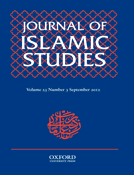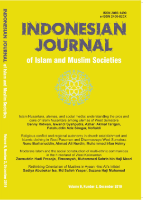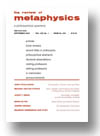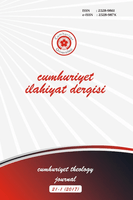
Nazariyat-Journal for the History of Islamic Philosophy and Sciences
Scope & Guideline
Illuminating the Legacy of Islamic Philosophy and Sciences
Introduction
Aims and Scopes
- Islamic Philosophy and Metaphysics:
The journal emphasizes the exploration of key philosophical figures and concepts in Islamic philosophy, such as the works of Avicenna, al-Farabi, and al-Razi. It investigates foundational metaphysical questions, including the nature of existence, causality, and the relationship between reason and faith. - Historical Contextualization:
Nazariyat is committed to placing philosophical texts and ideas within their historical contexts, examining how socio-political factors influenced intellectual developments in Islamic civilization. This includes studies of figures from various eras and regions, such as the Ottoman Empire and the Safavid period. - Interdisciplinary Approaches:
The journal encourages interdisciplinary research that intersects with fields such as theology, language, law, and science, highlighting the interconnectedness of knowledge within the Islamic tradition. - Critical Editions and Translations:
A unique contribution of the journal is its focus on the publication of critical editions and translations of important but lesser-known texts, providing scholars with access to primary sources for further study. - Ethics and Political Thought:
The journal also addresses themes of ethics and political philosophy, particularly how these ideas are articulated within Islamic frameworks, including discussions on the moral implications of political authority and governance.
Trending and Emerging
- Causality and Determinism:
A significant trend is the increasing focus on causality and determinism, particularly in relation to the works of Avicenna and post-Avicennian debates. This theme resonates with contemporary philosophical discussions on free will and the nature of existence. - Ethics in Political Thought:
There is an emerging interest in the ethical dimensions of political thought within Islamic philosophy, particularly how historical figures like al-Farabi and Avicenna articulate the relationship between ethics and governance. - Interdisciplinary Dialogues:
The journal is fostering interdisciplinary dialogues, linking philosophy with fields such as astronomy, mathematics, and law, reflecting a broader trend towards integrating various domains of knowledge in Islamic studies. - Critical Reassessments of Historical Texts:
An increase in critical reassessments of historical texts, including previously underexplored works, indicates a trend towards revitalizing interest in the Islamic intellectual tradition and its relevance to modern philosophical debates.
Declining or Waning
- Classical Sufism:
There has been a noticeable decrease in the number of publications specifically addressing classical Sufism, as the journal's focus shifts towards more philosophical and metaphysical inquiries. This may indicate a trend towards examining broader philosophical frameworks rather than specific mystical traditions. - Historical Figures with Limited Impact:
Papers focusing on lesser-known historical figures or those with minimal influence on the broader Islamic philosophical discourse are appearing less frequently. This suggests a consolidation of interest around more impactful thinkers and their contributions. - Methodological Analyses of Language:
While linguistic studies remain important, there seems to be a waning interest in purely methodological analyses of language within Islamic philosophy, as the journal increasingly prioritizes philosophical arguments and historical context.
Similar Journals

Journal of Islamic Studies
Exploring the Rich Tapestry of Islamic Culture and HistoryJournal of Islamic Studies, published by Oxford University Press, serves as a pivotal platform for the dissemination of research in the dynamic fields of Islamic culture, history, and literature. With an ISSN of 0955-2340 and an E-ISSN of 1471-6917, this esteemed journal has established itself within the upper echelons of academic scholarship, holding a Q1 ranking in Cultural Studies, History, Literature and Literary Theory, and Religious Studies as of 2023. Its distinguished standing among peers is further evidenced by Scopus rankings that place it within the 97th percentile for Literature and Literary Theory and the 91st percentile for both Religious Studies and History. Aimed at researchers, professionals, and students alike, the journal spans a broad temporal focus from 1990 to 1996 and continues from 2009 to 2024, nurturing vital discourse on Islamic studies without the barrier of open access. With its rich repository of articles, the Journal of Islamic Studies remains an essential source for advancing understanding and scholarship in a rapidly evolving academic landscape.

Oriens
Advancing Interdisciplinary Insights for a Deeper UnderstandingOriens is a distinguished academic journal published by BRILL, based in the Netherlands, focusing on the interdisciplinary integration of Cultural Studies, Philosophy, and Religious Studies. With an ISSN of 0078-6527 and E-ISSN of 1877-8372, it has established its presence since 2009 and continues to provide a vital platform for scholarly discourse through 2024. Recognized in the Q3 quartile for all three fields, the journal boasts impressive Scopus ranking positions, such as 75th out of 644 in Religious Studies, placing it in the top 12% percentile of its category. This makes Oriens an invaluable resource for researchers, professionals, and students seeking to explore significant themes and developments in these areas. While the journal is not open access, its subscription model ensures high-quality, peer-reviewed content that contributes significantly to the existing body of knowledge. By fostering a critical dialogue among diverse scholarly perspectives, Oriens remains an important conduit for advancing interdisciplinary insights and cultural understanding.

International Journal of Islamic Thought
Fostering Interdisciplinary Discourse in Islamic StudiesInternational Journal of Islamic Thought is a leading scholarly publication, dedicated to advancing knowledge and understanding in the fields of Islamic studies. Published by UNIV KEBANGSAAN MALAYSIA, FAC SCIENCE & TECHNOLOGY, this journal is positioned as an essential resource for researchers, professionals, and students alike, striving to explore and disseminate contemporary thoughts and interpretations within the Islamic intellectual tradition. With an impact factor indicative of its quality—ranking Q2 in Arts and Humanities and Q3 in Social Sciences as of 2023—the journal provides a robust platform for interdisciplinary discourse. Since its inception, the journal has embraced an open access model, ensuring that research is readily available to a global audience, thereby fostering further inquiry and collaboration. Hailing from Malaysia, the journal's commitment to contributing to both the local and international scholarly communities is underscored by its impressive standing in the Scopus rankings, reflecting its growing influence and reach in the academic landscape.

Indonesian Journal of Islam and Muslim Societies
Fostering understanding through open access to research.Indonesian Journal of Islam and Muslim Societies (IJIMS) is a leading platform for scholarly discourse in the fields of Islamic studies and social sciences, published by INST AGAMA ISLAM NEGERI-IAIN SALATIGA. Since its establishment in 2011, IJIMS has been dedicated to advancing the understanding of Islamic culture, society, and politics, with an impressive impact reflected in its Q1 ranking in Religious Studies and Q2 in Sociology and Political Science as of 2023. The journal not only ranks among the top in the Scopus database, occupying the 19th position in the Arts and Humanities—Religious Studies category, but it also offers open access to its content, making it readily available to a global audience. This commitment to accessibility ensures that researchers, students, and professionals can engage with high-quality research that informs and shapes contemporary dialogue on Islam and Muslim societies. With a convergence of rich academic contributions through to 2024, IJIMS stands as a vital resource for those looking to explore the complexities of Islam in a modern context.

Hawwa
Pioneering Research at the Crossroads of Gender and Culture.Hawwa is a distinguished academic journal published by BRILL, focusing on the intersections of culture, gender, and society. Established in the Netherlands, this journal has been a crucial platform for scholarly discourse since its inception in 2003. With an ISSN of 1569-2078 and an E-ISSN of 1569-2086, it serves as a vital resource for researchers and students alike, exploring the complexities of gender dynamics within various cultural contexts. In the rapidly evolving fields of Cultural Studies, Gender Studies, and Sociology and Political Science, Hawwa has achieved significant recognition, reflected in its 2023 Quartile Rankings (Q2 in Cultural Studies, Q3 in both Gender Studies and Sociology/Political Science) and commendable positions in the Scopus rankings. Although not an open-access journal, Hawwa maintains a commitment to fostering academic excellence and interdisciplinary dialogue, making it an essential read for those engaged in contemporary social theory and cultural analysis.

Islamic Africa
Deepening Insights into the Dynamics of Islam in AfricaIslamic Africa, published by BRILL, is a vital academic journal that serves as a scholarly platform dedicated to the exploration of Islamic culture and its multifaceted interactions with the African continent. With a focus on cultural studies, history, literature and literary theory, religious studies, and the social sciences, this journal invites contributions that deepen our understanding of the historical and contemporary dynamics of Islam in Africa. Although categorized in various quartiles, it holds significance as a resource for researchers and students, particularly those engaged in areas ranked within the Q3 and Q4 categories. Since its inception, Islamic Africa has evolved through converged years, actively promoting interdisciplinary dialogue among scholars. With its commitment to high-quality research, this journal aims to illuminate the complexities of Islamic traditions and societies in Africa, fostering a deeper appreciation of their contributions to global cultural heritage.

REVIEW OF METAPHYSICS
Elevating philosophical studies with timeless insights.REVIEW OF METAPHYSICS is a distinguished journal published by PHILOSOPHY EDUCATION SOC, INC, dedicated to advancing scholarly discourse in the field of philosophy. With an ISSN of 0034-6632 and an E-ISSN of 2154-1302, this journal has been a crucial platform for philosophical inquiry since its inception in 1975, converging its rich content from 1992 and continuously serving the academic community up to 2022. Based in the United States, specifically at 223 Aquinas Hall, Catholic University America, Washington, DC, it has secured a reputation for quality, reflected in its placement within the Q3 category of the 2023 Philosophy rankings, and a Scopus rank of 367 out of 806 in Arts and Humanities, placing it in the 54th percentile. Although it does not offer open access options, the REVIEW OF METAPHYSICS remains an essential resource for philosophers and students alike, fostering critical perspectives on metaphysical issues, and thereby contributing significantly to the advancement of philosophical studies.

Sakarya Universitesi Ilahiyat Fakultesi Dergisi-Journal of Sakarya University Faculty of Theology
Connecting scholars to the heart of theology.Sakarya Universitesi Ilahiyat Fakultesi Dergisi-Journal of Sakarya University Faculty of Theology is a leading academic journal dedicated to the field of theology, focusing on both religious studies and philosophical inquiries pertinent to contemporary issues. Published by SAKARYA UNIV, the journal has embraced an Open Access model since its inception in 2001, promoting the dissemination of knowledge and ensuring that the latest theological research reaches a global audience without barriers. Dedicated to fostering scholarly discourse, the journal welcomes contributions from researchers, professionals, and students alike, making it an essential resource for those engaged in the study of theology and related disciplines. With its commitment to rigorous peer review and a focus on high-quality research, this journal holds a significant place in the academic community, contributing to the advancement of theological scholarship in Türkiye and beyond.

Cumhuriyet Ilahiyat Dergisi-Cumhuriyet Theology Journal
Advancing the Frontiers of Theology and Philosophy.Cumhuriyet Ilahiyat Dergisi-Cumhuriyet Theology Journal is a distinguished peer-reviewed publication under the auspices of Cumhuriyet University, Faculty of Theology, based in Turkey. With an ISSN of 2528-9861 and an E-ISSN of 2528-987X, this open-access journal has been committed to advancing the scholarly discourse in the fields of Philosophy and Religious Studies since its inception in 2016. As part of a rapidly evolving academic landscape, the journal has achieved notable rankings, including Q3 in both Philosophy and Religious Studies, and Q4 in Social Sciences (miscellaneous) for 2023, indicating a growing impact in these disciplines. The journal aims to foster innovative research and critical dialogue, making it an essential resource for researchers, professionals, and students alike. With open access options, it ensures a wide dissemination of knowledge, amplifying the voices of scholars from diverse backgrounds and contributing significantly to the global academic community.

Turkish Journal of Islamic Economics-TUJISE
Advancing Islamic Finance through Scholarly InsightWelcome to the Turkish Journal of Islamic Economics (TUJISE), a premier platform for scholarly discourse in the field of Islamic economics and finance. Published by the RESEARCH CENTER ISLAMIC ECONOMICS-IKAM, this journal has been committed to advancing knowledge and innovation since it transitioned to an Open Access format in 2014, ensuring that critical research is accessible to a global audience. TUJISE is dedicated to providing a comprehensive exploration of topics such as ethical banking, development finance, and socio-economic theories rooted in Islamic principles, aiming to bridge gaps between mainstream economics and Islamic traditions. Our journal is positioned as a vital resource for researchers, practitioners, and students alike, seeking to contribute to the growing body of knowledge in Islamic economics. Its inclusive nature and commitment to quality research uphold the highest academic standards, making TUJISE an essential tool for anyone interested in the dynamics of Islamic financial systems and their implications in today's economy.